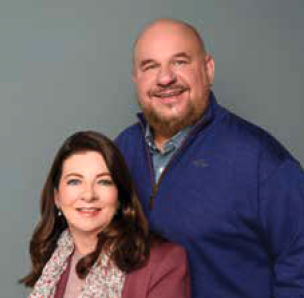Getting Good Help
A guide for Catholics
Dr. Greg Popcak Comments Off on Getting Good Help
Emily is a 32-year-old mother of three. She has been experiencing anxiety that is causing her to worry excessively about her children and her ability to be a good mother. She often has difficulty sleeping well at night because her worries keep her up. A practicing Catholic, she has tried to pray through these feelings but feels that her spiritual practices aren’t helping. She wonders if that means she isn’t a good enough Christian, or perhaps that she has let God down in some way.
Ramon and Jessica have been married for 11 years. They have been struggling in their relationship for several months. Arguments are becoming more frequent and escalating more quickly. In their last fight, Jessica said she was thinking about divorce. Concerned, Ramon reached out to the deacon at his parish for a referral to a marriage counselor. Ramon and Jessica are practicing Catholics and would like to get help from someone who could be supportive of their faith life.
Alexis is a 40-year-old woman who feels she needs help healing from traumatic events in her childhood that are impacting her ability to be the wife and mother she would like to be. Her parents were outwardly religious, but also were abusive and often used their religious faith to manipulate and shame Alexis. Although Alexis regularly attends church, she has a lot of questions about what a healthy faith looks like and why God would allow her parents to treat her as they did.

While a considerable body of research shows that people of faith tend to be more resilient and both mentally and physically healthier than their secular counterparts, they are far from immune from mental health issues, emotional struggles and relationship problems. These same studies show that when people of faith are hurting, pastors and deacons are often the first people they contact for assistance and referrals.
Helping Catholics get good help is a challenge. As a doctoral student, I led a national research project that investigated Catholic versus evangelical Protestant opinions on what both groups wanted from a counselor and how well both groups felt their local churches/dioceses were responding to the needs of emotional or relationship counseling. My study showed that while secular clients tend to want a counselor who is a licensed professional trained in the latest techniques, and evangelical Protestant clients tend to prefer faith-based counselors regardless of their professional qualifications, Catholics want both.
More than 1,000 Catholic respondents from 180 dioceses indicated that if they needed professional support for their emotional life or relationships, they preferred to receive help from professional qualified counselors who were trained in the latest techniques but who could also help them apply their faith to the challenges they face and use their spiritual practices to help them more effectively cope. In short, Catholics both need and demand more from their counselors.
Unfortunately, my study also revealed that most Catholic respondents were dissatisfied with their ability to find such help on their own, and did not feel that the local Church could either provide or make referrals to qualified faith-integrated counseling.
When possible, connecting Catholics with professionally qualified, faithful help is ideal, since studies show that clients tend to progress more effectively in therapy when they feel their faith and values are supported by their counselor. But how do you know whether you are making the best referrals possible for the souls in your care?
Faith Is Not Enough
Although evangelical Protestant Christian counselors have been active for decades, the emergence of Catholic counselors is a relatively recent phenomenon. Their growing presence is a welcome trend, but their formation can vary widely. Many pastors think that referring to a counselor who is a parishioner or who is known to be a practicing Catholic is enough, but this may or may not be true.
Kenneth Pargament, Ph.D., an expert in the integration of faith and clinical practice who won the American Psychological Association’s William James Award for his contributions to the psychology of religion, notes that counselors need specific training to know how to ethically and effectively integrate religious insights and spiritual practices into counseling. Most faith-based counselors, including Catholic counselors, lack formation in what is known as “spiritually integrated psychotherapy.”
……………………………………………………………………………………………………………………………………….
MORE2LIFE
CatholicCounselors.com offers an EWTN Radio program and a daily podcast called “More2Life,” which gives the support, tools and insights needed to live a more abundant life! Dr. Greg and Lisa Popcak are your hosts. Call 877-573-7825 between 10-11 a.m. in the Eastern time zone (9-10 a.m. Central) Monday through Friday. You can also send your questions anytime via email (Questions@More2LifeRadio.com).
………………………………………………………………………………………………………………………………………..
Spiritually integrated psychotherapy is an approach to counseling that trains therapists to recognize the physical, mental and spiritual components of an emotional or relational problem, and to develop interventions that facilitate a person’s human and spiritual integration. It employs a specific framework that helps counselors integrate religious insights and spiritual practices in a manner consistent with the client’s faith journey and is helpful in resolving the client’s concerns.
Spiritually integrated psychotherapists are certified by the Association for Clinical Pastoral Education, the same organization that accredits hospital chaplains. In 2019, the former American Association of Pastoral Counselors merged with the ACPE to better facilitate ongoing training and the development of spiritually integrated counseling professionals. It offers a comprehensive training program that teaches licensed counselors to help people in a manner that is consistent with their beliefs, spiritual practices and faith journeys. When making referrals, it would be good to seek counselors who are certified by the ACPE or supervised by an ACPE certified trainer.
Here are some additional factors to consider when making a referral for faith-based counselors.
Specific Training
Certification by the ACPE teaches therapists how to integrate faith and clinical practice in general, but it does not offer specific training in how to integrate the teachings and spiritual practice of specific faiths with counseling. For that, a counselor would need to have specific training in the pastoral theology associated with that particular faith tradition.
Ideally, when making a referral to a faith-based counselor, you will want to look for licensed professionals who have specific training in Catholic moral teaching and pastoral theology. For instance, I direct the Pastoral Solutions Institute (CatholicCounselors.com), a large Catholic pastoral tele-counseling practice. My team of over 20 full-time Catholic pastoral counselors provide professional, Catholic-integrated support for marriage, family and personal issues to clients around the world. I am an ACPE-certified, spiritually integrated psychotherapy trainer and all of the pastoral counselors on my team are members of ACPE. In addition, before any members of my team are permitted to work with clients in my practice, they must complete a course of formation and training that roots their work in Catholic anthropology and the Catholic vision of love. This includes training in the practical applications of Catholic moral theology. As a pastoral counseling practice, we are concerned with helping our clients overcome problems in a manner that enables them to become more faithful disciples of Christ.
Without such training, an otherwise competent professional counselor may be tempted to offer idiosyncratic or, worse, incorrect spiritual/theological guidance to a client. This can lead to a client receiving spiritual or theological guidance that leads to faith crises or even resentment toward the Church, especially if the counselor places religious burdens on the client that the Church does not require the client to bear or if the therapist excuses the client from following certain teaching that Catholics are obliged to follow. It requires a high degree of spiritual maturity and pastoral training to help clients find ways to apply Catholic teaching in a manner that is both faithful and practical.
Even professional counselors who are faithful Catholics themselves may not have the training necessary to provide effective pastoral guidance in the complicated situations that counselors must often help clients navigate. When such a professional is not available, it would be important for the pastor or deacon making the referral to offer ongoing spiritual guidance to help the parishioner be able to apply the professional guidance they are receiving in a manner that is consistent with the Catholic vision of life and love.
Relationship with the Church
It can also be important to consider the relationship a referral source has with the Church. Assuming the training I mentioned above, a counselor who has a formal relationship with their parish or diocese and works under the authority of their pastor or bishop is preferable to an independent counselor who offers some form of self-styled, “faith-based” or even “Catholic counseling” services.
For instance, my organization, the Pastoral Solutions Institute is listed in the Official Catholic Directory and recognized by the U.S. Conference of Catholic Bishops as a pastoral counseling ministry operating under the ecclesial authority of the bishop of Steubenville. We are an independent organization, but we are officially responsible to our bishop for the fidelity of our work and authorized to represent the Church concerning pastoral matters. In addition to our own expertise, we have access to theologians and canon lawyers who can provide additional consultation for especially challenging situations.
There are a few similar organizations across the country. Some are independent, like us, and some operate directly under the auspices of their parish or diocese. That said, most dioceses do not require the counselors employed by the local Catholic Charities office to be faithful Catholics or have any of the training I have described above. Be careful when making referrals to Church-sponsored agencies that the professionals they employ are capable of providing both competent psychological and pastoral guidance.
Catholics want, need and deserve to receive assistance from helping professionals who are equipped to provide the best psychological and spiritual support. Although it can be challenging to find such people, research shows that faithful clients who work with such professionals have better outcomes than those who receive help from purely secular providers or those who have a self-styled approach to integrating religion and counseling. Encourage your parish or diocese to require referral sources to have such training, and do your best to look for professionals who have as many of the credentials I’ve outlined as possible.
DR. GREG POPCAK is the director of the Pastoral Solutions Institute (CatholicCounselors.com). He is an ACPE-certified, spiritually integrated psychotherapy trainer, the author of over 20 books and the host of EWTN’s “More2Life.”
………………………………………………………………………………………………………………………………………
SERVICES PROVIDED BY CATHOLIC COUNSELORS
Catholic Counselors offers pastoral tele-counseling services to help the faithful find effective solutions for the following situations:
• Marital/relationship problems (couples or solo spouse)
• Parenting struggles
• Emotional problems
• Problem anger
• Understanding and establishing healthy boundaries
• Family-of-origin issues
• Recovery from trauma
• Sexual problems (individual and marital)
• Behavioral addictions/compulsions
• Spiritual crises
• Personal growth
Visit https://catholiccounselors.com/tele-counseling-services/ for additional information.
………………………………………………………………………………………………………………………………………….





